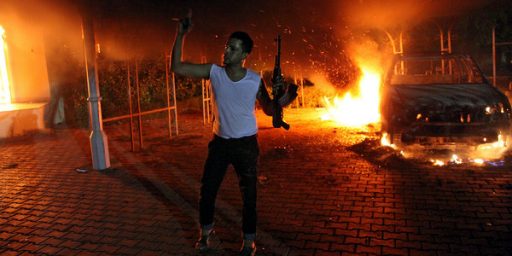Terrorism and IR Theory
Marc Lynch surveys the international relations theory literature of the last four years and finds that, shockingly, only 3% of the articles deal “even loosely with al-Qaeda, Islamism, or terrorism.”
One obvious objection would be that I excluded policy-oriented journals such as Foreign Affairs, International Security, and The Washington Quarterly, which do tend to publish much more on the topic. I did that intentionally, because that best captures the prestige value within the field of International Relations. The policy journals are generally undervalued within the International Relations profession, to the extent that many top Political Science Departments wouldn’t even consider a Foreign Affairs publication suitable for a tenure file. In other words, the fact that there is a lot more on Islamism and al-Qaeda in those journals only strengthens my claim – even though political scientists have a lot to say on the subject, they can’t or don’t say it in the most prestigious, theory oriented journals.
Sadly, as Dan Drezner can attest, that’s a fact.
I personally find the public policy journals far, far more interesting than the traditional IR literature. Tenure committees at most major institutions do not agree.
Update (1009): Part of the problem, aside from the view among many in the political science profession that public policy work amounts to “mere journalism,” is that doing quantitative work on a subject like terrorism, let alone al Qaeda, is very difficult because insufficient data exists to do rigorous studies. While there have been enough al Qaeda attacks to do intesting logical analysis, the “N” is way too small to do regression analysis.






I don’t think there’s anything particularly sinister about this: people tend to do what they were trained to do and very few of the who are in IR now were trained in the disciplines necessary to claim even rudimentary expertise in the areas necessary to comment intelligently on Islamism or al-Qaeda.
Was it Max Planck who said that the only way to change prevailing ideas in physics was for physicists to die? I.e. a generational shift?
Dave: Likely true as a partial answer, at any rate. Still, it speaks to the increasing isolation of political science, with a cadre of experts studying complex issues, from the world of public policy. If, four years after 9/11, they’re still not producing work on the most important issue in IR, then their research is, in both senses of the word, academic.